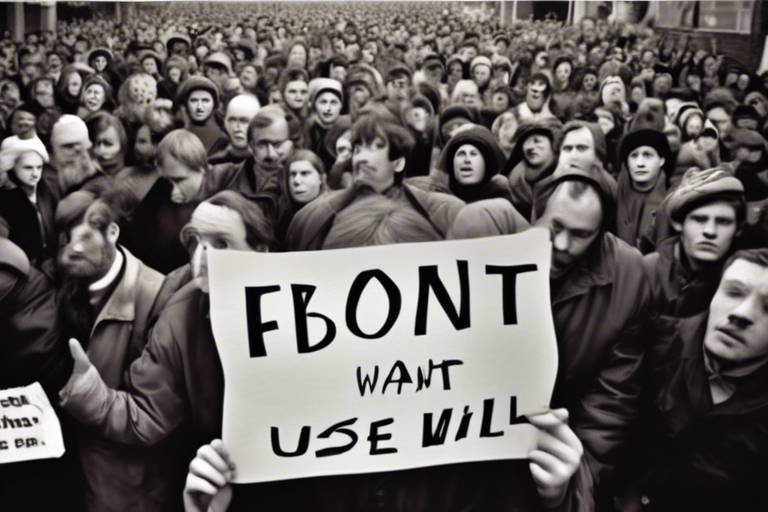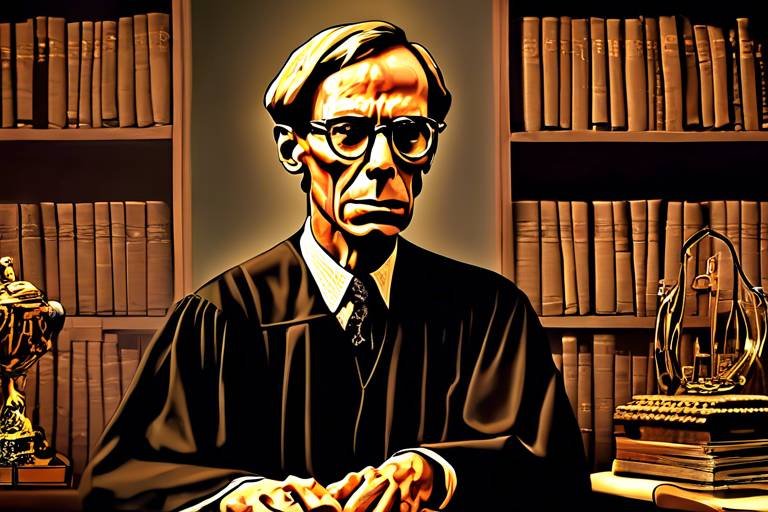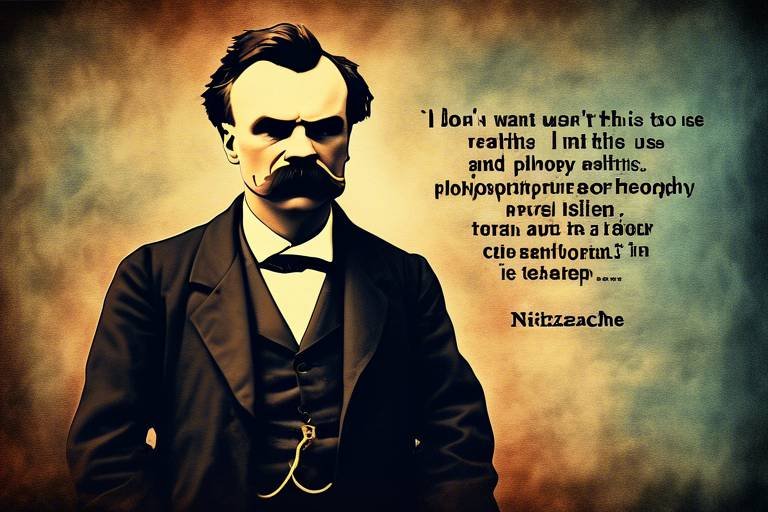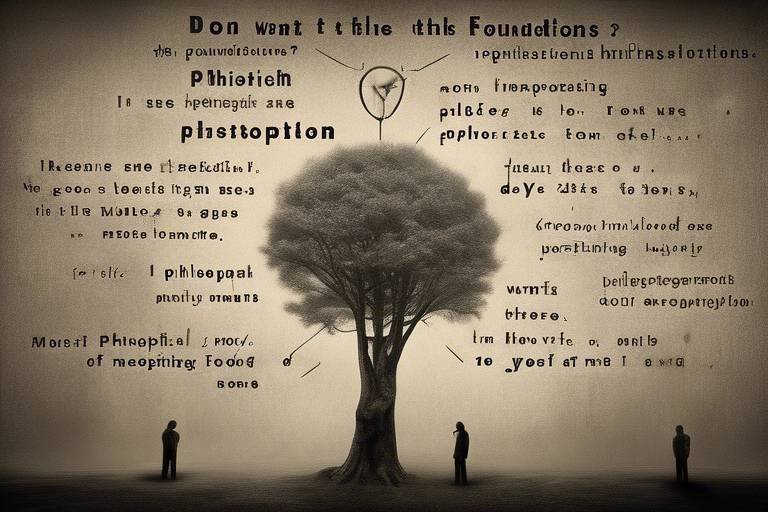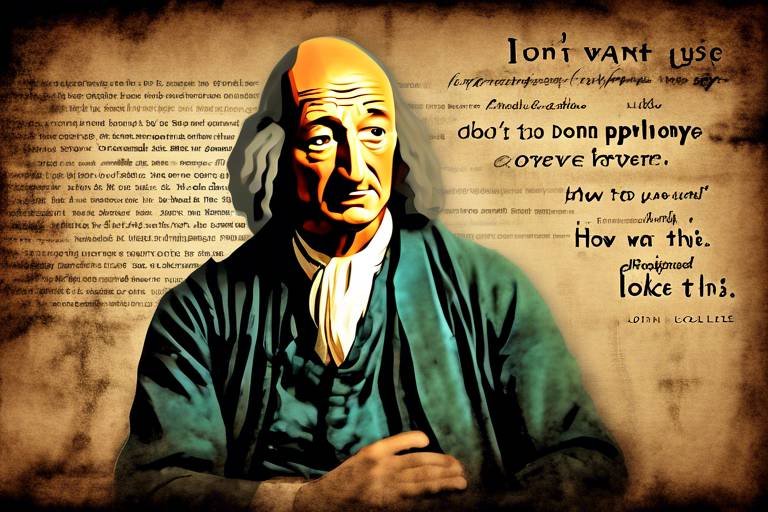The Philosophy of Quantum Mechanics
Quantum mechanics is not just a set of mathematical equations or a collection of experimental results; it is a profound philosophical journey that challenges our very understanding of reality. Imagine standing at the edge of a vast ocean, where each wave represents a different possibility, each ripple a question that beckons us to dive deeper into the mysteries of existence. This article explores the philosophical implications of quantum mechanics, examining its foundational principles, interpretations, and the impact on our understanding of reality and knowledge.
At the heart of quantum mechanics lies a fundamental challenge to our traditional notions of reality. In a world governed by classical physics, we often assume that an objective reality exists independently of our observations. However, quantum mechanics throws a wrench into this neat picture. It raises profound questions about the existence of objective truths. For instance, when we observe a quantum particle, are we merely uncovering its state, or are we actively participating in the creation of that state? The act of observation, it seems, plays a pivotal role in shaping the reality we experience.
Measurement in quantum mechanics is not just a technical procedure; it's a philosophical conundrum. When we measure a quantum system, we are not just passively collecting data; we are influencing the system itself. This brings us to the concept of the observer effect, which suggests that the mere presence of an observer can alter the outcome of quantum experiments. It's as if the universe is saying, "Hey, your attention matters!" This phenomenon ignites a flurry of philosophical implications, challenging our understanding of causality and reality.
The observer effect raises intriguing questions about the nature of free will and determinism. If our observations can influence the outcome of quantum events, what does that mean for our autonomy? Are we truly the architects of our choices, or are they merely reflections of external influences? This philosophical debate is akin to a dance between freedom and constraint, where the steps are dictated by the very act of observation. It invites us to ponder whether our lives are predetermined by the laws of physics or if we possess the power to shape our destinies.
The intersection of quantum mechanics and free will is a topic ripe for exploration. If the observer effect implies that our actions can influence reality, does that grant us a sense of freedom, or does it merely highlight our entanglement with the universe? This philosophical inquiry leads us to question the extent of our autonomy. Are we like puppets dancing on strings of quantum uncertainty, or do we hold the reins of our fate? The implications for free will are profound, urging us to reconsider our understanding of choice, agency, and responsibility.
Another fascinating aspect of quantum mechanics is quantum entanglement, where particles become interconnected in ways that defy classical intuition. Imagine two particles that, despite being light-years apart, can instantaneously affect each other's states. This phenomenon challenges our understanding of locality and suggests a deeper interconnectedness of the universe. It raises questions about the fabric of reality itself: Are we all part of a grand tapestry woven together by the threads of quantum relationships? Entanglement invites us to rethink our place in the cosmos and the nature of existence.
One of the most widely accepted interpretations of quantum mechanics is the Copenhagen interpretation. This theory posits that physical systems do not have definite properties until they are measured. In other words, reality is not a fixed entity but rather a fluid concept shaped by our observations. The philosophical ramifications of this interpretation are staggering, as it suggests that knowledge itself is contingent on the act of measurement. It leads us to ask: Is reality a shared experience, or is it uniquely constructed by each observer?
While the Copenhagen interpretation has its proponents, there are several alternative interpretations of quantum mechanics that offer different philosophical perspectives. For instance, the many-worlds interpretation posits an infinite number of parallel universes, each representing a different outcome of quantum events. This interpretation challenges our notions of choice and reality, suggesting that every decision we make spawns a new universe. On the other hand, the pilot-wave theory introduces hidden variables, attempting to restore determinism in quantum mechanics. These alternative views enrich the philosophical discourse surrounding quantum mechanics, inviting us to explore the myriad ways in which we can understand the universe.
The many-worlds interpretation is a mind-bending concept that proposes the existence of countless parallel universes. Imagine a vast library, where each book represents a different universe, each containing a unique narrative of choices and outcomes. This interpretation raises profound questions about existence and reality. If every possible outcome exists in its own universe, what does that say about our sense of agency? Are we merely players in an infinite game, with each choice echoing across the multiverse?
Pilot-wave theory offers a different lens through which to view quantum mechanics. By introducing hidden variables, it aims to restore a sense of determinism to quantum phenomena. Think of it as a guiding wave that directs particles along predetermined paths. This interpretation challenges the randomness often associated with quantum mechanics, suggesting that beneath the surface chaos lies a structured reality. The philosophical significance of pilot-wave theory lies in its potential to reconcile our intuitive understanding of causality with the peculiarities of quantum behavior.
- What is the observer effect in quantum mechanics? The observer effect refers to the phenomenon where the act of measuring a quantum system influences its state, suggesting that observation plays a crucial role in defining reality.
- How does quantum entanglement challenge our understanding of locality? Quantum entanglement indicates that particles can be interconnected in ways that allow for instantaneous effects across vast distances, defying classical notions of locality.
- What are the implications of the many-worlds interpretation? The many-worlds interpretation suggests that every possible outcome of a quantum event exists in its own parallel universe, raising questions about choice and existence.
- What does pilot-wave theory propose? Pilot-wave theory introduces hidden variables to restore determinism in quantum mechanics, suggesting that particles follow predetermined paths influenced by guiding waves.

The Nature of Reality
Quantum mechanics has a way of turning our understanding of reality on its head. Traditionally, we’ve viewed reality as a stable, objective entity—something that exists independently of our perception. However, quantum mechanics introduces a fascinating twist: it suggests that reality is not as straightforward as we once thought. Imagine you're peering into a mysterious box; the contents inside may shift and change based on your mere act of looking. This analogy illustrates how quantum mechanics raises profound questions about the very fabric of reality.
At the heart of this discussion lies the concept of superposition. In classical physics, an object exists in a definite state, like a light switch that is either on or off. But in the quantum realm, particles can exist in multiple states simultaneously until they are observed. This leads to the mind-bending idea that reality is not fixed but rather a tapestry woven from countless possibilities. It’s as if the universe is holding its breath, waiting for an observer to make a choice, at which point a single thread is pulled from the myriad of potential outcomes.
Moreover, the role of the observer is pivotal. The act of observation itself seems to collapse these multiple possibilities into a single outcome. This phenomenon raises the question: Are we merely passive spectators in the universe, or do we actively shape reality with our perceptions? This is not just a philosophical musing; it has real implications for how we understand knowledge and existence. If our observations influence reality, can we ever claim to know the universe in its entirety? Or are we forever limited by our perspective?
To further complicate matters, quantum mechanics introduces the idea that objective truths may not exist in the way we assume. Consider the famous double-slit experiment, where particles behave like waves when not observed, but as particles when measured. This duality suggests that the very act of measurement can alter the behavior of particles, leading to an unsettling conclusion: what we perceive as reality is contingent upon our interactions with it. In essence, reality becomes a collaborative effort between the observer and the observed, blurring the lines of objectivity.
To illustrate these concepts, let's look at a simple table summarizing key aspects of quantum mechanics and their implications for our understanding of reality:
| Concept | Description | Philosophical Implication |
|---|---|---|
| Superposition | Particles exist in multiple states until observed. | Reality is not fixed but a collection of possibilities. |
| Observer Effect | The act of measurement alters the state of a quantum system. | Knowledge and reality are intertwined with perception. |
| Quantum Entanglement | Particles become interconnected, regardless of distance. | Challenges the notion of locality and independence. |
As we delve deeper into the philosophy of quantum mechanics, we find ourselves grappling with these challenging ideas. The nature of reality, as painted by quantum mechanics, is not a simple canvas but rather a complex and dynamic mural. It invites us to reconsider our understanding of existence, knowledge, and the very role we play in the universe. Are we merely observers, or are we co-creators of the reality we perceive? The questions are as profound as they are perplexing, leaving us to ponder the depths of our own understanding.
- What is superposition in quantum mechanics? Superposition refers to the ability of a quantum system to exist in multiple states at once until it is measured.
- How does the observer effect impact reality? The observer effect suggests that the act of observation can change the state of a quantum system, indicating that reality is influenced by our perceptions.
- What is quantum entanglement? Quantum entanglement is a phenomenon where particles become interconnected, such that the state of one particle instantaneously influences the state of another, regardless of the distance separating them.

Measurement and Observation
The realm of quantum mechanics is often described as a strange and bewildering landscape, where the act of measurement is not merely a passive observation but a transformative event that can alter the very fabric of reality. Imagine standing in front of a painting: your mere gaze can change the way you perceive it. In quantum mechanics, this analogy takes on a whole new level of complexity. When we talk about measurement in this context, we’re not just noting the position or momentum of a particle; we are engaging in a dance with the universe where our presence influences the outcome. This phenomenon raises profound philosophical questions about the nature of reality and our role as observers.
To understand how measurement works in quantum mechanics, we must first recognize that particles exist in a state of probability until they are observed. This notion can be likened to a coin spinning in the air—until it lands, it embodies both heads and tails. It is only upon measurement that the coin 'decides' its fate. This leads us to the crux of the matter: the act of observation collapses the wave function, a mathematical description of the quantum state, into a single outcome. This collapse is not just a technical detail; it poses significant implications for our understanding of reality.
One key aspect of measurement is the observer effect, which suggests that the act of observing a quantum system invariably influences its state. For instance, consider the famous double-slit experiment. When particles, such as electrons, are fired at a barrier with two slits, they create an interference pattern, indicating wave-like behavior. However, when we attempt to measure which slit the particle goes through, the interference pattern disappears, and the particles behave like classical particles. This curious shift exemplifies how our interaction with quantum systems can fundamentally change their behavior, leading to a myriad of philosophical discussions.
The observer effect is not just a quirky characteristic of quantum mechanics; it challenges our traditional notions of objectivity. If our observations can alter the state of a quantum system, what does this mean for our understanding of reality? Are we mere spectators, or do we play an active role in shaping the universe around us? This dilemma leads to a fascinating exploration of free will and determinism. If our choices and observations can influence outcomes, it raises the question: are we truly autonomous beings, or are we puppets of the quantum world?
As we delve deeper into the implications of the observer effect, we stumble upon the philosophical debate surrounding free will. If our observations can change the behavior of quantum particles, does that mean our choices are similarly influenced by external factors? This line of thought can be unsettling. It suggests that our decisions might not be as independent as we believe. Instead, they could be entwined with the fabric of the universe, shaped by a complex interplay of quantum mechanics and external stimuli.
Another fascinating phenomenon related to measurement and observation is quantum entanglement. This occurs when particles become interconnected in such a way that the state of one particle instantaneously affects the state of another, regardless of the distance separating them. Imagine two dancers performing a perfectly synchronized routine, no matter how far apart they are. This interconnectedness challenges our classical notions of locality and suggests that the universe is far more intertwined than we previously imagined. The implications of entanglement extend beyond mere curiosity; they provoke questions about the nature of information, communication, and the very structure of reality itself.
In summary, the act of measurement in quantum mechanics is not just a technical procedure; it is a philosophical conundrum that challenges our understanding of reality, observation, and free will. As we continue to explore these concepts, we are not only unraveling the mysteries of the quantum world but also confronting the fundamental questions of existence. The interplay between measurement and observation invites us to reconsider our place in the universe and the nature of the reality we inhabit.
- What is the observer effect in quantum mechanics? The observer effect refers to the phenomenon where the act of measuring a quantum system alters its state, leading to different outcomes.
- How does quantum entanglement work? Quantum entanglement occurs when two or more particles become linked, such that the state of one particle instantaneously influences the state of another, regardless of distance.
- Does the observer effect imply a lack of free will? The observer effect raises questions about free will, suggesting that our choices may be influenced by external factors, although this remains a topic of philosophical debate.

The Observer Effect
The observer effect in quantum mechanics is nothing short of a philosophical enigma that flips our understanding of reality on its head. Imagine you’re peeking into a secret garden; your mere presence changes the scene. In the quantum realm, this analogy holds true, as the act of observing a quantum system can fundamentally alter its behavior. When we delve into this phenomenon, we start to question the very fabric of reality. Are we mere spectators, or do we play a role in shaping the universe around us? This is the essence of the observer effect.
At its core, the observer effect suggests that particles exist in a state of probability until they are measured. This concept challenges the classical view of particles having definite properties, like position or momentum, prior to observation. Instead, quantum mechanics proposes that particles exist in a superposition of states, and it is only through measurement that these states collapse into a single outcome. This brings us to a critical question: if observation influences reality, what does that mean for our understanding of knowledge and truth?
To illustrate this, let’s consider a classic thought experiment known as Schrödinger's cat. In this scenario, a cat is placed in a sealed box with a radioactive atom that has a 50% chance of decaying. Until someone opens the box to observe the cat, it is considered both alive and dead simultaneously—existing in a superposition. The moment the box is opened, the cat's state collapses into one of the two possibilities. This paradox not only highlights the observer effect but also raises profound questions about our role in determining reality.
Furthermore, the implications of the observer effect stretch beyond just quantum mechanics; they seep into philosophical discourse about free will and determinism. If our observation can influence the outcome of quantum events, then what does that say about our choices? Are we truly making autonomous decisions, or are we simply interacting with a pre-existing tapestry of possibilities? This line of inquiry has sparked debates among philosophers, scientists, and thinkers alike.
In summary, the observer effect serves as a fascinating intersection between quantum mechanics and philosophy. It invites us to reconsider our perceptions of reality, knowledge, and free will. As we continue to explore these ideas, we find ourselves not just as passive observers of the universe but as active participants in its unfolding narrative. The more we learn, the more complex and awe-inspiring the universe becomes, challenging us to rethink what we know about existence itself.
- What is the observer effect in quantum mechanics?
The observer effect refers to the phenomenon where the act of observation alters the state of a quantum system, leading to different outcomes based on whether or not it is measured. - How does the observer effect relate to free will?
The observer effect raises questions about free will by suggesting that our observations may influence outcomes, leading to debates on whether our choices are truly autonomous. - What is Schrödinger's cat?
Schrödinger's cat is a thought experiment that illustrates the observer effect, where a cat in a sealed box is simultaneously alive and dead until the box is opened and observed. - Does the observer effect apply to everyday life?
While the observer effect is primarily a quantum phenomenon, it encourages philosophical discussions about perception and reality in our daily lives.

Implications for Free Will
When we dive into the depths of quantum mechanics, we can’t help but stumble upon a question that has puzzled philosophers for centuries: Do we truly have free will? The observer effect, a cornerstone of quantum theory, suggests that the mere act of observation can influence the outcome of an event. This phenomenon raises a significant philosophical dilemma: if our observations can alter reality, to what extent are our choices genuinely autonomous? Are we the masters of our fate, or are we merely puppets dancing to the strings of quantum uncertainties?
To illustrate this conundrum, imagine a game of chess. Each move you make seems deliberate, yet the rules of the game dictate your options. In the quantum realm, however, it’s as if the board itself shifts every time you decide to make a move. This unpredictability leads us to ponder whether our decisions are based on free will or are simply reactions to the unpredictable nature of the universe.
Furthermore, the implications of quantum mechanics extend beyond individual choices; they challenge the very fabric of determinism. If every action we take can be influenced by external observations, then the concept of predetermined outcomes becomes murky. Are we living in a deterministic universe where every event is the result of prior states, or is the universe a chaotic dance of probabilities where free will can flourish?
To explore this further, let’s break down some key points regarding the implications for free will:
- Observer Influence: The act of observing can change outcomes, suggesting our decisions may not be entirely our own.
- Determinism vs. Indeterminism: Quantum mechanics introduces randomness, challenging the notion that everything is predetermined.
- Philosophical Debates: This uncertainty fuels discussions on whether we have control over our lives or if we are subject to external influences.
As we grapple with these questions, it's essential to recognize that the implications of quantum mechanics on free will are not just theoretical musings; they resonate deeply within our understanding of human existence. The idea that our choices could be influenced by unseen quantum forces is both exhilarating and unsettling. It forces us to confront our beliefs about agency and responsibility.
In conclusion, the intersection of quantum mechanics and free will is a profound area of inquiry that invites us to reconsider our understanding of reality. As we continue to explore the mysteries of the quantum world, we must remain open to the possibility that our perception of free will may be as fluid and unpredictable as the particles we study.
- What is the observer effect?
The observer effect refers to changes that the act of observation can make on a phenomenon being observed, particularly in quantum mechanics. - Does quantum mechanics support free will?
Quantum mechanics introduces elements of randomness and uncertainty, leading to debates on whether free will exists or if our choices are influenced by external factors. - How does quantum entanglement relate to free will?
Quantum entanglement suggests interconnectedness between particles, which can complicate our understanding of individual agency and decision-making.

Quantum Entanglement
Quantum entanglement is one of the most fascinating and perplexing phenomena in quantum mechanics, capturing the imagination of physicists and philosophers alike. Imagine a scenario where two particles become intertwined in such a way that the state of one particle instantly influences the state of the other, regardless of the distance separating them. This peculiar connection defies our classical understanding of locality and suggests that the universe is far more interconnected than we ever imagined. It's as if these particles are engaged in a cosmic dance, synchronizing their movements in an unexplainable manner, even if they are light-years apart.
To grasp the implications of quantum entanglement, consider this analogy: picture a pair of gloves. If you find one glove, you immediately know the type of the other glove, even if it’s in a different room. In the quantum realm, once two particles are entangled, measuring one particle gives you instant knowledge about the other, no matter how far apart they are. This phenomenon was famously referred to by Einstein as "spooky action at a distance," highlighting the challenges it poses to our traditional views of space and time.
Entanglement raises profound questions about the nature of reality and information. For instance, if two particles can be entangled across vast distances, what does this mean for our understanding of causality? Are the particles communicating in a way that transcends the speed of light? The implications are staggering, suggesting that information can be shared instantaneously, challenging the very fabric of our understanding of the universe.
Moreover, quantum entanglement has practical applications that are revolutionizing technology. In the realm of quantum computing, entangled particles are used to perform calculations at speeds unimaginable with classical computers. This leads to the development of quantum cryptography, which promises unbreakable encryption methods based on the principles of entanglement. Imagine a world where your data is secure because any attempt to intercept it would immediately disturb the entangled state, alerting you to the intrusion!
As we delve deeper into quantum entanglement, we uncover a tapestry of interconnectedness that challenges our perception of reality. It invites us to ponder the philosophical implications: If particles can be entangled, what does that say about our own connections with each other and the universe? Are we all part of an intricate web of existence, where our actions resonate beyond our immediate surroundings? The exploration of quantum entanglement not only enhances our understanding of the physical world but also prompts us to reflect on the very nature of existence itself.
- What is quantum entanglement? Quantum entanglement is a phenomenon where two particles become interconnected in such a way that the state of one instantly influences the state of the other, regardless of the distance between them.
- How does quantum entanglement challenge classical physics? It defies the classical notion of locality, suggesting that information can be shared instantaneously across distances, which contradicts the speed of light limitation imposed by relativity.
- What are the practical applications of quantum entanglement? Quantum entanglement is used in quantum computing and quantum cryptography, leading to advancements in secure communication and computational power.
- Does quantum entanglement imply a connection between all particles? While it suggests a deep interconnectedness in the quantum realm, it does not necessarily imply that all particles are entangled; rather, it highlights the potential for such connections under specific conditions.

The Copenhagen Interpretation
The Copenhagen interpretation stands as one of the most notable frameworks in quantum mechanics, primarily shaped by the work of physicists Niels Bohr and Werner Heisenberg in the early 20th century. At its core, this interpretation posits that quantum particles do not have definite properties until they are measured. Imagine a coin spinning in the air; it is neither heads nor tails until you catch it. Similarly, quantum entities exist in a state of superposition, embodying multiple possibilities simultaneously until an observer intervenes. This radical idea challenges our conventional understanding of reality, suggesting that the act of observation plays a crucial role in determining the state of a quantum system.
One of the most profound implications of the Copenhagen interpretation is its assertion that reality is not objective in the classical sense. The observer's role becomes central, raising questions about the nature of existence itself. Are we merely passive spectators in the grand theater of the universe, or do we actively shape it with our observations? This perspective leads us to ponder the philosophical ramifications of our knowledge. If reality is contingent upon observation, how can we trust our understanding of the universe? Are the truths we hold dear merely reflections of our perceptions?
The Copenhagen interpretation also introduces the concept of complementarity, which suggests that different experimental setups can reveal different aspects of a quantum system, but never simultaneously. For instance, a particle can exhibit wave-like behavior in one experiment and particle-like behavior in another. This duality forces us to reconsider how we define knowledge and reality. It implies that our understanding of the universe is inherently limited and contextual, much like viewing a multi-faceted gem from different angles—each perspective offers a unique glimpse but never the full picture.
Moreover, the Copenhagen interpretation has led to significant debates surrounding the concept of measurement. What exactly constitutes a measurement? Is it merely the act of observing, or does it require a conscious observer? This question is not just academic; it touches upon the very fabric of reality. The interpretation suggests that a quantum system remains in a state of potentiality until it is measured, leading to the paradox of the observer effect. This phenomenon implies that the act of measurement itself can influence the outcome of an experiment, further complicating our understanding of causality and free will.
In conclusion, the Copenhagen interpretation serves as a pivotal point in the philosophy of quantum mechanics, inviting us to reconsider our notions of reality, knowledge, and existence. It challenges the idea of an objective universe, emphasizing the intricate dance between observer and observed. As we delve deeper into the quantum realm, we find ourselves grappling with profound questions that extend beyond physics into the very essence of what it means to know and to exist.

Alternative Interpretations
When we dive into the world of quantum mechanics, we quickly realize that the traditional interpretations just scratch the surface. The beauty of quantum mechanics lies in its complexity, which has led to a plethora of alternative interpretations that challenge our understanding of reality. These interpretations are not just academic exercises; they provoke profound questions about existence, choice, and the nature of the universe itself. Let’s explore some of the most intriguing alternative interpretations that have emerged over the years.
One of the most captivating interpretations is the Many-Worlds Interpretation. Imagine a universe where every decision you make spawns a new reality. In this interpretation, every possible outcome of a quantum event actually occurs, but in separate, parallel universes. This means that if you flip a coin, one universe sees it land heads, while another sees it land tails. It’s like an infinite branching tree of realities, where every choice creates a new branch. This interpretation not only stretches our imagination but also raises questions about the nature of choice itself. Are we merely navigating through a vast multiverse, or do we have genuine agency in shaping our reality?
On the other hand, we have the Pilot-Wave Theory, which introduces a different flavor to the quantum conversation. This theory posits that particles have definite positions and velocities, guided by a "pilot wave." In essence, while quantum mechanics typically embraces probability and uncertainty, pilot-wave theory attempts to restore a sense of determinism. It suggests that hidden variables govern the behavior of particles, providing a more classical framework. This interpretation challenges the randomness associated with quantum mechanics and invites us to reconsider our understanding of causality. If particles are indeed influenced by hidden variables, what does that mean for our perception of free will?
Each of these interpretations, while distinct, shares a common thread: they force us to confront our assumptions about reality. They challenge the idea that there is a single, objective truth. Instead, they present a tapestry of possibilities that intertwine and overlap in ways that can be both exhilarating and perplexing. The philosophical implications of these interpretations extend far beyond the realm of physics, inviting us to question the very fabric of existence.
To get a clearer picture of these interpretations, let’s summarize them in the table below:
| Interpretation | Key Concept | Philosophical Implications |
|---|---|---|
| Many-Worlds | Infinite parallel universes | Challenges the notion of choice and existence |
| Pilot-Wave Theory | Hidden variables guiding particles | Restores determinism and questions randomness |
As we ponder these interpretations, it’s essential to recognize that they are not merely theoretical musings. They reflect our ongoing quest to understand the universe and our place within it. The debates surrounding these interpretations are vibrant and ongoing, with physicists and philosophers alike contributing to the discourse. So, the next time you ponder the mysteries of quantum mechanics, remember that the conversation is far from over. There are countless paths yet to explore, each leading us deeper into the heart of reality.
- What is the Many-Worlds Interpretation?
This interpretation suggests that all possible outcomes of a quantum event occur in separate, parallel universes. - How does Pilot-Wave Theory differ from traditional quantum mechanics?
Pilot-wave theory introduces hidden variables, offering a deterministic view of quantum events, as opposed to the inherent randomness of traditional quantum mechanics. - Why are alternative interpretations important?
They challenge our understanding of reality and provide different perspectives on fundamental questions about existence, choice, and determinism.

Many-Worlds Interpretation
The (MWI) of quantum mechanics is a mind-bending concept that suggests every quantum event spawns a branching of the universe into multiple, parallel realities. Imagine standing at a crossroads, where each choice you make leads to a different path. In the realm of MWI, every decision creates a new universe, resulting in an infinite tapestry of realities existing simultaneously. This interpretation challenges our conventional understanding of existence and invites us to ponder profound questions about choice, reality, and existence.
According to MWI, when a quantum system is measured, rather than collapsing into a single outcome, it splits into all possible outcomes. For instance, if you flip a coin, instead of it landing on heads or tails, the universe divides into two: one where the coin shows heads and another where it shows tails. This idea radically alters our perception of probability and determinism, suggesting that every possibility is realized in some universe. It's like a cosmic game of chance played on an unimaginable scale, where every potential outcome is played out in its own unique universe.
This interpretation raises fascinating philosophical implications. If every possible outcome exists, what does that mean for our understanding of reality? Are we merely players in a vast multiverse, with our choices echoing across countless dimensions? And if every decision creates a new universe, does that diminish the significance of our choices? It’s a bit like being in a choose-your-own-adventure book, but with an infinite number of pages, each reflecting a different version of your life.
Moreover, the Many-Worlds Interpretation challenges the traditional notion of determinism. In classical mechanics, the future is predictable if we know the present state of a system. However, in MWI, the unpredictable nature of quantum mechanics implies that every potential outcome is equally real, leading to a universe where determinism and randomness coexist in a beautifully complex dance.
Critics of the Many-Worlds Interpretation often argue that it introduces an excessive number of universes, leading to the question of how we can ever confirm or refute its claims. After all, if every decision leads to a new universe, how can we possibly measure or observe these alternate realities? Supporters counter that MWI elegantly resolves some of the paradoxes present in other interpretations, such as the observer effect and wave function collapse. It presents a coherent framework that avoids the need for special rules governing observation.
In conclusion, the Many-Worlds Interpretation invites us to reconsider our understanding of reality and existence. It opens the door to a universe that is far more intricate than we ever imagined, where every choice creates a new reality. As we continue to explore the depths of quantum mechanics, the implications of MWI remind us that the universe is not just a single story but a vast library of infinite tales, each unfolding in its own unique way.
- What is the Many-Worlds Interpretation?
It is an interpretation of quantum mechanics that suggests every quantum event creates a branching of the universe into multiple, parallel realities. - How does MWI differ from traditional quantum mechanics?
Unlike traditional interpretations that involve wave function collapse, MWI posits that all possible outcomes occur in separate, branching universes. - What are the implications of MWI for free will?
MWI raises questions about the nature of choice, suggesting that every decision results in the creation of a new universe, which might challenge our understanding of autonomy. - Is there any way to test the Many-Worlds Interpretation?
Currently, MWI cannot be directly tested, but it provides a coherent framework for understanding quantum phenomena without the need for wave function collapse.

Pilot-Wave Theory
The , also known as de Broglie-Bohm theory, offers a fascinating alternative to the conventional interpretations of quantum mechanics. At its core, this theory proposes that particles have definite positions and velocities at all times, guided by a "pilot wave." This wave is a real entity that exists in a higher-dimensional space, influencing the behavior of particles without the need for them to be in a state of superposition. Imagine a boat being steered by a wave; the wave dictates where the boat goes, much like how the pilot wave dictates the paths of particles in the quantum realm.
One of the most compelling aspects of the Pilot-Wave Theory is its attempt to restore a sense of determinism to quantum mechanics. In traditional interpretations, particles behave probabilistically, leading to the notion that outcomes are inherently uncertain. However, in the pilot-wave framework, while the initial conditions of the system may be unknown, the outcomes are determined by the underlying wave function. This means that if we had complete knowledge of both the particle's position and the pilot wave, we could predict the future with absolute certainty.
Despite its intriguing propositions, the Pilot-Wave Theory does face a few challenges. For instance, it introduces the concept of hidden variables—elements that are not observable but influence the behavior of particles. This raises questions about the nature of these variables and whether they can ever be fully understood or measured. Critics argue that this reliance on hidden variables complicates the elegant simplicity that quantum mechanics often embodies.
To illustrate the differences between the Pilot-Wave Theory and other interpretations, consider the following table:
| Interpretation | Key Features | Philosophical Implications |
|---|---|---|
| Pilot-Wave Theory | Particles have definite positions and are guided by a pilot wave. | Restores determinism; suggests hidden variables. |
| Copenhagen Interpretation | Particles exist in superpositions until measured. | Emphasizes the role of the observer; leads to inherent uncertainty. |
| Many-Worlds Interpretation | All possible outcomes occur in parallel universes. | Challenges notions of reality and existence; suggests an infinite multiverse. |
In conclusion, the Pilot-Wave Theory invites us to rethink our understanding of quantum mechanics. It suggests that beneath the seemingly chaotic nature of the quantum world lies a structured, deterministic framework. This perspective not only challenges our beliefs about randomness but also enriches the philosophical discourse surrounding free will and the nature of reality. Are we merely players in a game dictated by chance, or do we have a deeper connection to the universe's underlying mechanics? The Pilot-Wave Theory certainly nudges us toward the latter.
- What is the Pilot-Wave Theory? The Pilot-Wave Theory posits that particles are guided by a pilot wave, allowing for definite positions and velocities at all times.
- How does it differ from the Copenhagen Interpretation? Unlike the Copenhagen Interpretation, which embraces probability and superposition, the Pilot-Wave Theory maintains that particles have definite states influenced by hidden variables.
- Does the Pilot-Wave Theory restore determinism? Yes, it suggests that while we may not know all initial conditions, the outcomes are determined by the pilot wave.
Frequently Asked Questions
- What is the main philosophical implication of quantum mechanics?
Quantum mechanics challenges our traditional understanding of reality. It raises profound questions about the existence of objective truths and how observers influence the outcomes of quantum events. This shifts the way we think about knowledge and reality itself.
- How does the observer effect impact our understanding of free will?
The observer effect suggests that the act of observation can alter the behavior of quantum systems. This leads to intriguing discussions about free will—are our decisions truly autonomous, or are they influenced by external observations and conditions? It’s a philosophical conundrum that keeps thinkers engaged.
- What is quantum entanglement and why is it significant?
Quantum entanglement refers to a phenomenon where particles become interconnected in such a way that the state of one particle instantly influences the state of another, regardless of distance. This challenges our notions of locality and suggests a deeper interconnectedness within the universe, prompting us to rethink our understanding of space and time.
- Can you explain the Copenhagen interpretation?
The Copenhagen interpretation is one of the most widely accepted views in quantum mechanics. It posits that physical systems do not have definite properties until they are measured. This interpretation has significant philosophical implications regarding the nature of reality, suggesting that knowledge is not about discovering objective truths but rather about the information we gather through observation.
- What is the many-worlds interpretation?
The many-worlds interpretation proposes that every quantum event spawns a multitude of parallel universes, each representing different outcomes. This idea challenges our conventional understanding of choice and existence, suggesting that all possibilities occur in separate realities, which can be mind-boggling to consider.
- How does pilot-wave theory differ from other interpretations?
Pilot-wave theory introduces hidden variables to explain quantum phenomena, aiming to restore a sense of determinism to quantum mechanics. Unlike interpretations that embrace randomness, pilot-wave theory suggests that particles follow specific trajectories influenced by a guiding wave, which offers a different philosophical perspective on reality and predictability.





